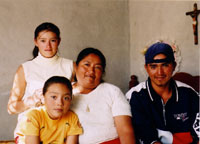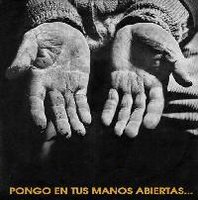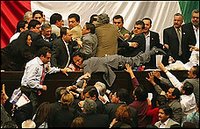Mercenaries and the Worth of American Citizenship
The New York Times reports today that the United States is considering increasing troop levels in Iraq in order to secure the captial of Baghdad. This would raise the number from 134,000 to close to 150,000. This same week, the Boston Globe reported that officials at the Pentagon are considering recruiting immigrants and foreigners into the military , exchanging service for citizenship.
Some worry that using noncitizens in the military would amount to relying mercenaries to do the work of providing security and peacekeeping. Obviously, Pentagon officials have ignored the advice of Niccolo Machiavelli, who argued against the use of mercenaries in "The Prince":
"Any man who founds his state on mercenaries can never be safe or secure, because they are disunited, ambitious, undisciplined and untrustworthy--bold fellows among their friends, but cowardly in the face of the enemy: they have no fear of God or loyalty to men"
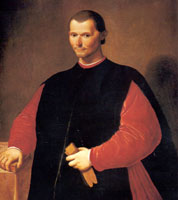
Machiavelli believes that mercenary troops are untrustworthy for two reasons: either they will always be trying to increase their authority by attacking their employers or by "oppressing people with whom you have no quarrel" In short, mercenary troops can be loose canons. Machiavelli concludes: "Experience teaches that independent princes and well-armed republics accomplish great things, but mercenary armies do nothing but lose."

Of course, some might argue that Machiavelli is talking about the use of mercenaries by republics for defense and the U.S. is far from a simple republic anymore. Instead some theorists, from a wide political spectrum, suggest that the U.S. is better thought of as an empire. Michael Walzer responds that even if we are not strictly speaking an empire, we must acknowledge that our power is wide reaching and hegemonic in away that is similar to how empires work.
A final interesting thought about this proposal is how American citizenship is conceived. The Pentagon is betting on the idea the citizenship is a kind of good that noncitizens and foreigners will want so badly that they will put their lives at risk to get it. The idea that American citizenship is this kind of good is at the heart of Joel Olson's terrific book "The Abolition of White Democracy"( thanks to our friend Tony Vogt for turning us on to this).
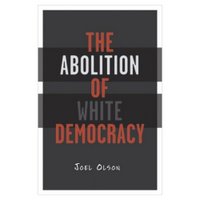
Olson builds on the Judith Shklar's idea that to be a citizen in America is to have a kind of special social "standing" with its owns rights,responsibilitiess, and respect. Olson argues that American citizenship has been something that white people have appropriated to further their own supremacy over people of color, denying them full standing in society and, thus, full human dignity. In other words, whiteness has come to equal citizenship and more civic benefits come with whiteness than not. This would seem to be supported by a recent study that suggest that immigrants with whiter complexions tend to do much better economically in ours society than those with darker skin.
Labels: american democracy, citizenship, diversity
